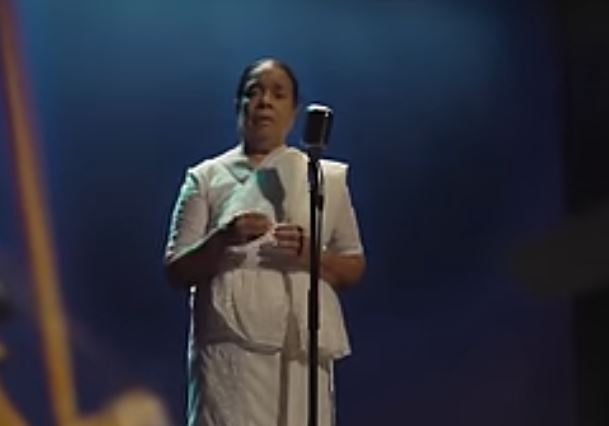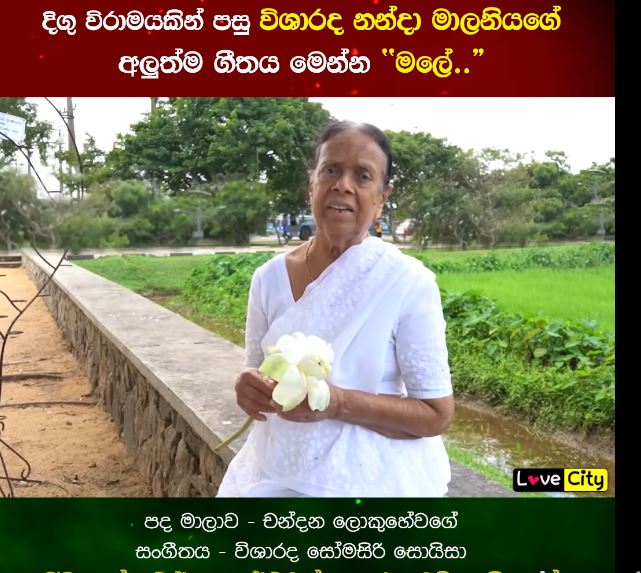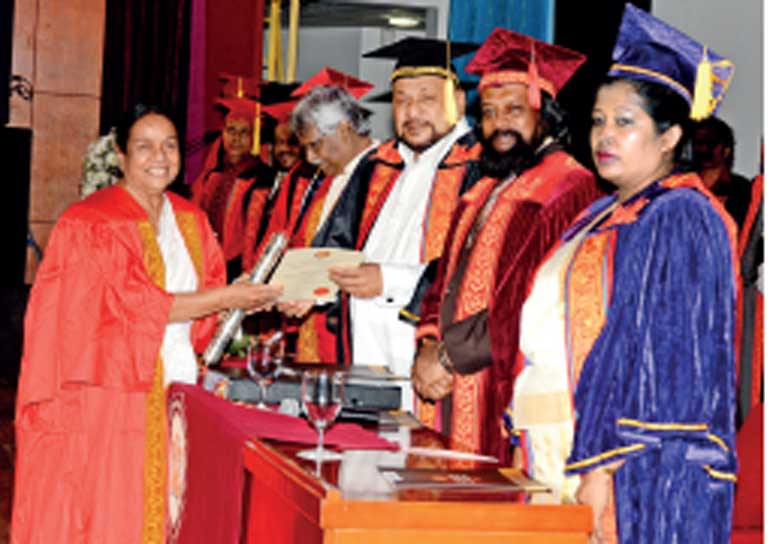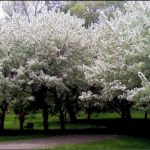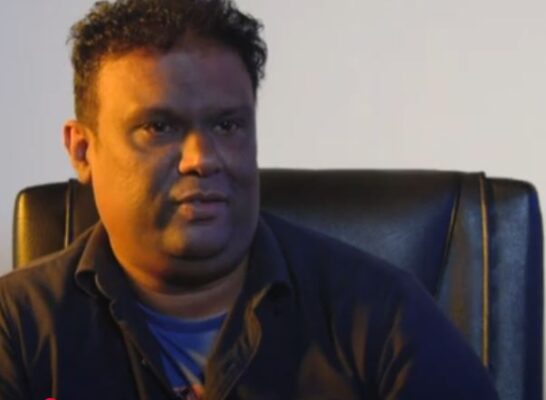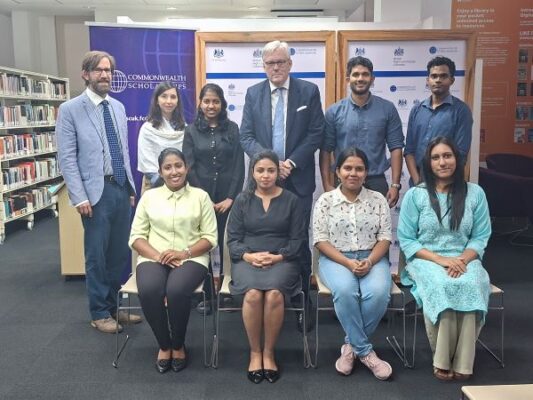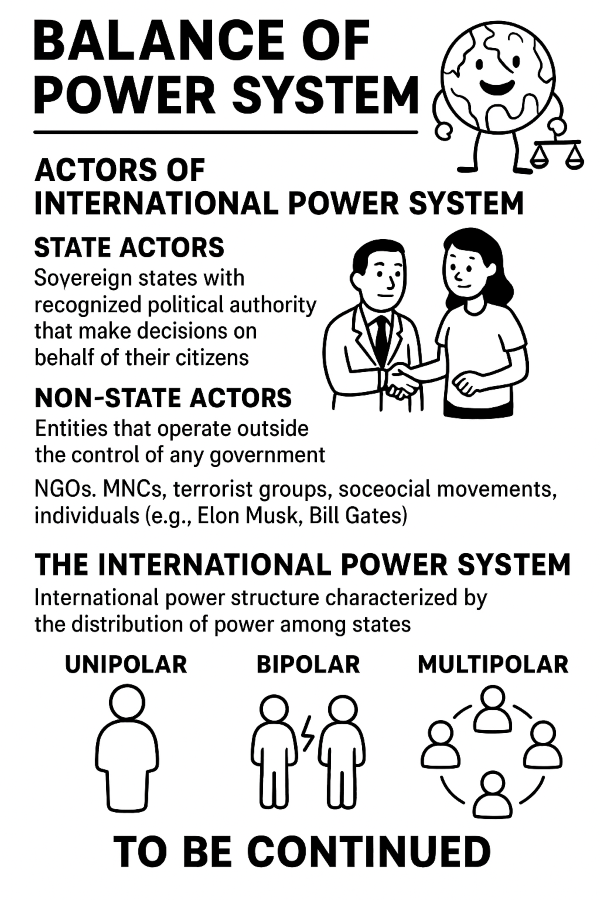Visharada Nanda Maliniya Turns 81 – By Dr. Gamini Kariyawasam

Nanda Maliniya reached her 81st year of maturity on August 23. She has won 12 university awards and 10 presidential awards for her musical talent and singing abilities. This article was prepared as a tireless effort to draw a heartfelt commemorative painting for her.
Mirihana Arachchige Vincent Perera and Liyanage Emily Perera of a rural family in Aluthgama Levanduwe were blessed with a baby girl, the fourth child in their family of nine, on August 23, 1943. The father was a Sannali professional (tailor), and the mother was an exemplary housewife with children. The new born baby was named Nanda Malini. As a child, she grew up under the warmth of four brothers and four sisters.
Nanda Malini, on the occasion of her 81st birthday, added a new song to the Sinhala music literature as a tribute to the country. After a long silence, she sang “Male Malee…”, her latest song.>
Nanda Malini, who left her hometown of Aluthgama and moved to Kotahena, Colombo, studied at Sri Gunananda Vidyalaya, Kotahena. Her teacher, Mrs. Margaret Perera, recognized the girl’s talent and directed her towards the music sector. With the support of her teacher, Nanda participated in the ‘Saraswathi Mandapaya’ hosted by Mr. Karunaratne Abeysekara, a popular program on Lanka Radio. There, Nanda was given the opportunity to sing the song “Budhu Sadu Mam Saman Valekwe Vennam,” composed by Asoka Colombo with a melody created by musician D.D. Danee.
“Budhu Sadu….>
When Nanda Malini recalls her difficult school life, it is hard not to shed a tear.
Addressing school children, Nanda Malini remembered a moment from her bitter past:>
“…I didn’t have good shoes to go to school, so my schoolmates called me ‘Kattaya’ because of the katta sandals that I wore back then. I experienced the pain of words that make people uncomfortable at an early age. I was born in a slum in Kotahena, and I feel proud of the journey I’ve taken to come this far. It was through effort, patience, dedication, and the right guidance from my father and mother that I reached where I am today. I have money now, but my life hasn’t changed much… We need to stay grounded, and children need to learn to live with humility…”
Growing up in a Buddhist, lower-middle-class, and left-wing family, Malini remembers her childhood with authenticity. “We were very poor and had no assets,” she once recalled on social media, reminiscing about her difficult and trying life.
“…I was born in a rural family in Aluthgama Levanduwe… It is still a poor village… Later, we moved to Kotahena… Kotahena Sixty-Two Estate… Many people said that Kotahena is a slum… So my family had nine members… My father was poor but rich in humanity… Besides work, I sewed coats even while walking home… I went from house to house and sold those coats… I wasn’t accepted in some houses back then… but today I am in the hearts of all of them… I am happy to receive this recognition today… but even today, I am the same person I was then… Never forget your past…”
Recently, remembering her Sannali father, Nanda Maliniya contributed a unique song under Geetha Sahitya titled “My Sannali Thaththaa.” The humbleness and bittersweet experiences embedded in her singing voice have been a boon to her musical journey.>
Let us further look at the honest, sincere, and humble words that came from Nanda Maliniya’s mouth:
“…My father took great pains to keep us alive… I would go to the market near the port with my mother or my elder sister and bring home the things we needed… We used some cheap vegetables to fill our meals that day… So we never threw away food… Even today, the biggest reason for my simple lifestyle is that my past was full of poverty… We had to eat together… We didn’t have colorful or beautiful clothes to wear… But we wore what we had, cleanly and neatly…”
“…I’m not ashamed to talk about poverty in my life story… But I’m afraid to lie… I’m ashamed… Because to cover one lie, we have to tell ten lies… I still love that poverty and my past… Without lying, I came as myself on this journey, and it was worth it…”
Galana gagaki jeevithe ….>
Nanda Malini, a courageous woman who faced various harsh experiences in her life, still lives a very simple life. You must have noticed that she participates in various events, even goes to meet state leaders and dignitaries, wearing a white saree with a single braid.
When she was young, she studied music with Victor Perera. By accident, she received the necessary knowledge for her aesthetic journey at the Bhatkande Sangeetayatanaya in Lucknow, India, in 1963. From a young age, Nanda Malini’s children have had infinite devotion to their country. That eternal patriotism, desha vaatsalya, was reflected in her song, “You Are Our Sri Lanka.”>
She entered Bhathkhande University for the second time in 1984 and obtained a Bachelor of Music degree. She was also awarded a PhD by the University of Sri Lanka.
Nanda received her degree certificate from Chancellor and Musician Sanath Nandasiri.
She married Suneth Gokula and was blessed with two daughters, Varuni Saroja and Ama Sarada
When listening to any of Nanda Maliniya’s songs, it is evident that she is an artist who has clearly identified the heart-pounding appeal of the lowest and middle-class strata of our society. Nanda Malini can be considered a brand in the social and cultural context of the country. The reality of her songs amply confirms that nature. This world, which you sit on the altar and offer yourself to, may rise against you tomorrow. When you sit on the altar and shine with grace, your curse becomes a song.>
Musicians and anthropologists emphasize that the evolution of Sinhala music, like every other culture in the world, has been shaped by the social conditions of our country in each era. In the early 20th century, after the Buddhist revival and the rise of the Sinhalese, lyricists, singers, and musicians engaged in an effort to present the thoughts and wishes of the current social flow in an emotional way.
From the left-wing views of her family environment, Nanda Malini also honed her melodious singing. Carrying a very strong radical potential within her, she sang in a way that allowed this vitality to emerge. It is certain that even the Sinhalese petty capitalist class fell in love with her and were captivated and attracted by her songs.
Her audience, the Sinhala middle class born out of the 1956 revolution, entered a different political stream in the 70s. The left leaned towards the JVP to some extent, while the Sinhalese lower middle class was attracted to the new formations made up of the Communist Party, the Samasamaja Party, and their offshoots. This difference also began to appear through Nanda Maliniya’s singing skills, as she understood the social flow of the moment well. As a result, Nanda Maliniya’s “Pawana” music became popular.
Nanda Malini joined the people with the flag in her hand when they took to the streets to express the pains raging in their hearts.
Nanda Malini had to face various abuses from different governments because of her oppositional stance in standing up against injustice. I remember one such accusation made against her. During the administration of President Premadasa, when I was working as the General Manager of the Independent Television Network (ITN), a weekly Sinhala children’s program named “Suwada Padma” was introduced instead of the English children’s program “Seymour Street.”As the General Manager of ITN, the program was entrusted to Nanda Malini
She managed to run the program at a very high level with the participation of children. Meanwhile, we received an order from the then Minister of State for Media, Mr. A.J. Ranasinghe, to immediately remove Nanda Malini, who was not in favor of the current government. Despite the unfair order, I met Hon President Premadasa and hastened to make him understand the correct facts. As the children’s program conducted by Nanda Malini in a very attractive manner was very popular among children, he agreed to continue her services.
Nanda Malini first lit up the silver screen in 1961 as a playback singer. It was for the film ‘Ranmuthu Duva,’ directed by Mike Wilson, which was the first color film in Sri Lanka. Pandit Amaradeva’s song “Galana Gangaki…,” sung by Nanda with Narada Disasekara, was awarded the best film song of the year at the university awards ceremony.
Me sinhala apage ratayi…>
Among her collection of songs are “Preda Maha Raai,” “Pahan Kanda,” “Song of Satyaye Geethaya,” “Pawana,” “Hemanta Udaya,” “Sindu Hodiya,” “Malmada Bisav,” “Kirimaduvel,” “Gramophone Gee,” “Araliya Landata,” “Malata Renu,” “Nilambare,” and “Sari Podittak.” These songs resonate deeply in the hearts of listeners.
“Pawana,”>
The song “Sannaliyane,” sung by Nanda Maliniya for the first time , Pandit Amaradeva’s very popular radio program “Madhuvanthi,” has become a memorable part of our collective memory. Nanda Malini’s emotional singing provided invaluable support in presenting this universal reality in a literary form, by recreating a verse composed by Sarojani Naindu as a Mahagama Sekara song, based on a group of Indian weavers.
Nanda Malini’s innate human piety, sense of justice and injustice, and her ability to stand firmly in the face of adversity seem to be qualities she carried from a past life. Professor Sunil Ariyaratne can be seen as the shadow of her musical miracle.
Long live 81-year-old Nanda Malini, the Great Gandharva of Sri Lanka. We wish you a healthy and prosperous life.
Dr. Gamini Kariyawasam



